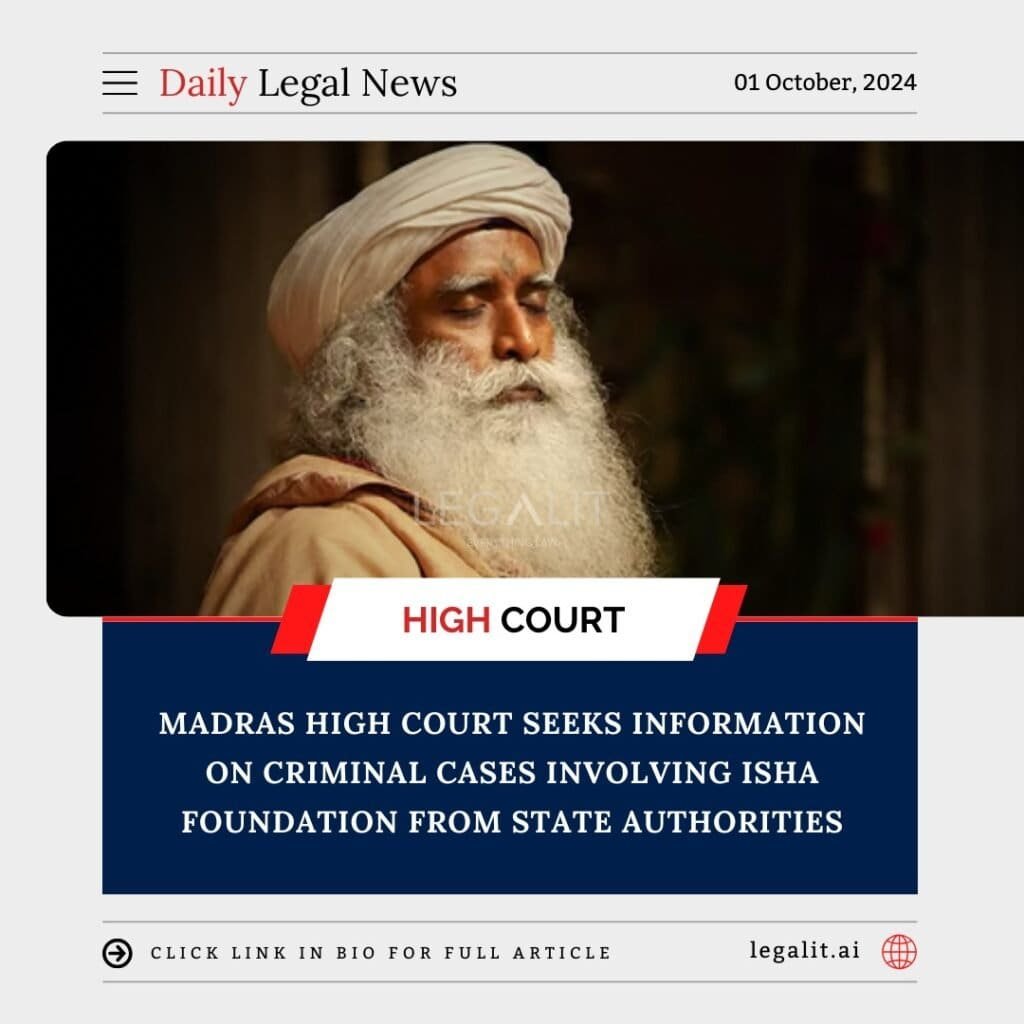
The Madras High Court has directed the state government to provide detailed information regarding any criminal cases registered against the Isha Foundation, a prominent spiritual organization founded by Sadhguru Jaggi Vasudev. This directive comes amid ongoing scrutiny of the Foundation’s activities and operations, reflecting the Court’s commitment to transparency and accountability in matters involving public interest.
Background: The Isha Foundation and Its Activities
Founded in 1992, the Isha Foundation is known for its yoga programs, social initiatives, and environmental campaigns. It has gained significant popularity both in India and internationally, attracting a large following. However, the Foundation has also faced criticism and allegations regarding various activities, including land use, environmental impact, and adherence to regulatory norms.
The recent scrutiny has led to calls for an examination of any potential criminal activities linked to the organization. The Madras High Court’s inquiry aims to address these concerns by seeking clarity on the legal standing of the Isha Foundation and any actions taken against it.
The Court’s Directive: Seeking Clarity on Criminal Cases
The Court’s order to the state government requires a comprehensive report detailing any criminal cases filed against the Isha Foundation. This includes information on the nature of the charges, the status of investigations, and any proceedings that may have taken place. The Court emphasized the need for transparency in understanding the legal challenges faced by the Foundation, which operates on a large scale and has significant influence.
This move highlights the judiciary’s role in ensuring that organizations, regardless of their stature or popularity, are held accountable for their actions. By requesting this information, the Court aims to clarify the legal framework surrounding the Foundation and ensure that any allegations are thoroughly investigated.
Implications of the Court’s Inquiry
The inquiry into the Isha Foundation could have broader implications for similar organizations and their operations in India. As spiritual and non-profit organizations gain prominence, the need for regulatory oversight and accountability becomes increasingly important. The Madras High Court’s directive serves as a reminder that no entity is above the law, and transparency is essential in maintaining public trust.
Moreover, this inquiry may prompt other states to reevaluate their oversight mechanisms regarding non-profit organizations, particularly those with significant influence and resources. The results of the Court’s inquiry could lead to more rigorous scrutiny of the Foundation’s activities, potentially impacting its operations and public image.
Public Response and Reactions
The public response to the Court’s directive has been mixed. Supporters of the Isha Foundation argue that the organization has made positive contributions to society through its various initiatives, including environmental conservation, education, and health awareness programs. They contend that the scrutiny may undermine the Foundation’s efforts and hinder its ability to serve the community.
Conversely, critics believe that the inquiry is necessary to ensure accountability and address any potential misconduct. They argue that transparency is vital for maintaining the integrity of organizations that operate in the public sphere and that any allegations must be thoroughly investigated.
Next Steps: Awaiting the State’s Response
As the Madras High Court awaits a response from the state government, the outcome of this inquiry remains to be seen. The information provided by the state will play a crucial role in shaping the Court’s subsequent actions and determining the legal standing of the Isha Foundation.
The case highlights the ongoing tension between the spiritual community and regulatory authorities, as well as the complexities of balancing organizational autonomy with public accountability. The Court’s engagement in this matter reflects its broader mandate to uphold the rule of law and protect public interest.
Conclusion
The Madras High Court’s directive for the state to disclose details of any criminal cases against the Isha Foundation underscores the importance of transparency and accountability in the operations of organizations with significant societal influence. As the judiciary seeks to clarify the legal framework surrounding the Foundation, the case serves as a pivotal moment in the ongoing dialogue about the responsibilities of non-profit and spiritual organizations in India.
The outcome of this inquiry will not only impact the Isha Foundation but also set a precedent for how similar organizations are held accountable for their actions. By ensuring that all entities are subject to scrutiny under the law, the Court reinforces the principle that accountability is essential in fostering public trust and safeguarding the interests of society.